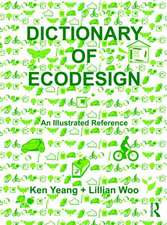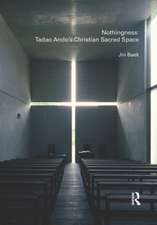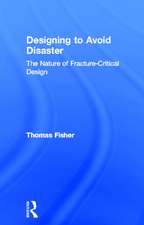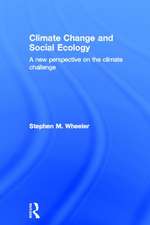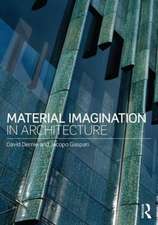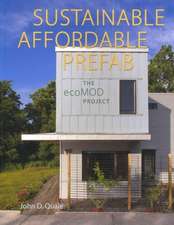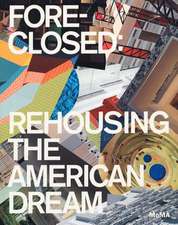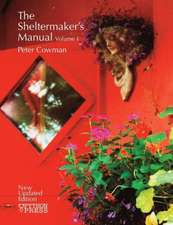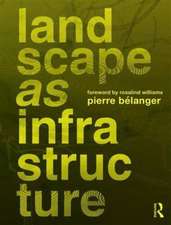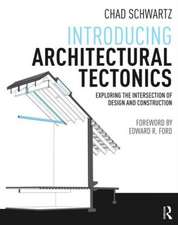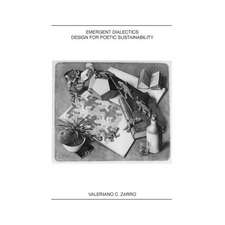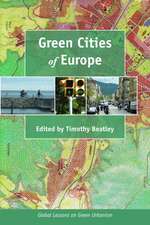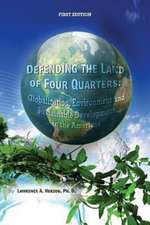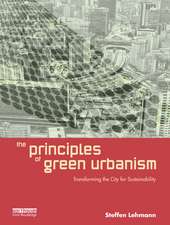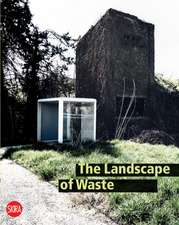Architecture as the Ethics of Climate
Autor Jin Baeken Limba Engleză Hardback – 6 iul 2016
Drawing on Tetsuro Watsuji‘s (1889-1960) philosophy, the book illuminates climate not as a collection of objective natural phenomena, but as a concrete form of bond in which "who we are"—the subjective human experience—is indivisibly intertwined with the natural phenomena. The book further elucidates the inter-personal nature of climatic experiences, criticizing a view that sees atmospheric effects of climate under the guise of personal experientialism and reinforcing the linkage between climate and ethos as the appropriateness of a setting for human affairs. This ethical premise of climate stretches the horizon of sustainability as pertaining not only to man’s solitary relationship with natural phenomena—a predominant trend in contemporary discourse of sustainability—but also to man’s relationship with man. Overcoming climatic determinism—regional determinism, too—and expanding the ethics of the inter-personal to the level where the whole and particulars are joined through the dialectics of the mutually-negating opposites, Jin Baek develops a new thesis engaging with the very urgent issues inherent in sustainable architecture.
Crucially, the book explores examples that join climate and the dynamics of the inter-personal, including:
- Japanese vernacular residential architecture
- the white residential architecture of Richard Neutra
- contemporary architectural works and urban artifacts by Tadao Ando and Aldo Rossi
Preț: 1272.41 lei
Preț vechi: 1551.72 lei
-18% Nou
Puncte Express: 1909
Preț estimativ în valută:
243.47€ • 254.89$ • 201.46£
243.47€ • 254.89$ • 201.46£
Carte tipărită la comandă
Livrare economică 07-21 aprilie
Preluare comenzi: 021 569.72.76
Specificații
ISBN-13: 9780415623490
ISBN-10: 0415623499
Pagini: 152
Ilustrații: 69
Dimensiuni: 174 x 246 mm
Greutate: 0.45 kg
Ediția:1
Editura: Taylor & Francis
Colecția Routledge
Locul publicării:Oxford, United Kingdom
ISBN-10: 0415623499
Pagini: 152
Ilustrații: 69
Dimensiuni: 174 x 246 mm
Greutate: 0.45 kg
Ediția:1
Editura: Taylor & Francis
Colecția Routledge
Locul publicării:Oxford, United Kingdom
Public țintă
Postgraduate and ProfessionalCuprins
Introduction 1. Tetsuro Watsuji’s Notion of Fudo and Its Cultural Significance 1.1 Beyond Heidegger’s Dasein 1.2 What is Fudo? 1.3 Ex-sistere and Reflection 1.4 Beyond Regional Determinism 1.5 Ethics of the Inter-personal 1.6 Inter-Fudos and the Subject transcending the Insularity of a Fudo 2. "Self-less Openness" and Fudo: Renewed Sustainable Significance of Japanese Vernacular Architecture 2.1 Criticism of the Traditional Japanese House 2.2 Corridor and Individualism 2.3 The Wall, Fan and the Wind Conduit 2.4 "Self-less Openness" of Japanese Vernacular Housing 2.5 Modernity and the Duality between the Inside and Outside 2.6 Joint Measure and the Spatiality of Japanese Vernacular Housing 2.7 From Collectivity to Privacy 2.8 Contemporary Fudo-sensitive House 3. The Ecology of "We" and Ambient Warmth: Richard Neutra’s Ecological Architecture 3.1 Beyond Psychoanalysis and Positivism 3.2 Coordinated Balance of Different Forces 3.3 Anchorage and the Coordination of Forces 3.4 Illumination 3.5 Warmth and the Inter-personal in Japanese Tradition 3.6 Facing and the Ecology of "We" 3.7 Ecos and the Inter-personal 4. Dialectics between the Regional and the Trans-Regional 4.1 Fudo and Beyond Critical Regionalism 4.2 Criticism of Regionalism 4.3 Fudo and the Resuscitation of the Corporeal Efficacy of a Code 4.4 Fudo and the Dialectics of Opposites 4.5 Dialectics of Opposites and Human Praxis 4.6 Beyond Regional Confines 4.7 The Regional and the Trans-Regional 4.8 Type and Differences Conclusion Index
Notă biografică
Jin Baek teaches theory and history at the Department of Architecture and Architectural Engineering of Seoul National University. His research focuses on environmental ethics, cross-cultural issues that exist between East Asia and the West in both architecture and urbanism, and the cultural significance of urban regeneration.
Recenzii
"This remarkable study by Jin Baek draws important insights about architectural sustainability and ethics from the non-dualistic philosophy of Tesuro Watsuji (1889-1960). Showing the limitations of current positions that objectify the environment and propose an architecture of personal experimentalism, the book participates significantly in current conversations around the concept of atmosphere and attunement. Drawing particularly from Watsuji’s central concept of climate (Jap. Fudo) as a trans-subjective and encompassing context for the "social body" involving both culture and nature, Baek demonstrates both the misconception of atmosphere as a subjective effect, and the radical limitations of a discourse on sustainability that treats this problem as a mere technological question reducible to mathematical parameters." - Alberto Pérez-Gómez, Saidye Rosner Bronfman Professor of the History of Architecture, McGill University, Montreal
"Not since Ruskin’s Ethics of the Dust (1865) has there been such a persuasive account of the inseparability of architecture’s ethical and environmental responsibilities. Baek’s study is particularly relevant today, when sustainability discussions suffer from both a narrow dependency on the natural sciences and corresponding neglect of the social and cultural dimensions of resource allocation. Through studies of great architects—Ando, Neutra, Aalto and others—Architecture as the Ethics of Climate has reoriented architecture toward more humane, just, and inspiring solutions." - David Leatherbarrow, University of Pennsylvania, USA
"It’s rare that architectural writing reaches the depths that Jin Baek’s does, rich in scholarship and without undue technicality. Based in the ethico-phenomenological philosophy of Tetsuro Watsuji—one of Japan’s most prolific philosophers and a critic of Heidegger's—Baek generates new avenues of architectural thought, ones that give deeper meaning to "sustainability" as well as how architecture might help us live happily among each other. Climate understood as fudo, inescapable even as we try to escape it, is best accepted with an opened window, a reached-for sweater, a shaken umbrella, and a friend to agree "it’s gotten fresh outside." As neutralization gives on to engagement, so experience gives on to relationship." - Michael Benedikt, Hal Box Chair in Urbanism, ACSA Distinguished Professor, Director, Center for American Architecture and Design, School of Architecture, The University of Texas at Austin, USA
"Not since Ruskin’s Ethics of the Dust (1865) has there been such a persuasive account of the inseparability of architecture’s ethical and environmental responsibilities. Baek’s study is particularly relevant today, when sustainability discussions suffer from both a narrow dependency on the natural sciences and corresponding neglect of the social and cultural dimensions of resource allocation. Through studies of great architects—Ando, Neutra, Aalto and others—Architecture as the Ethics of Climate has reoriented architecture toward more humane, just, and inspiring solutions." - David Leatherbarrow, University of Pennsylvania, USA
"It’s rare that architectural writing reaches the depths that Jin Baek’s does, rich in scholarship and without undue technicality. Based in the ethico-phenomenological philosophy of Tetsuro Watsuji—one of Japan’s most prolific philosophers and a critic of Heidegger's—Baek generates new avenues of architectural thought, ones that give deeper meaning to "sustainability" as well as how architecture might help us live happily among each other. Climate understood as fudo, inescapable even as we try to escape it, is best accepted with an opened window, a reached-for sweater, a shaken umbrella, and a friend to agree "it’s gotten fresh outside." As neutralization gives on to engagement, so experience gives on to relationship." - Michael Benedikt, Hal Box Chair in Urbanism, ACSA Distinguished Professor, Director, Center for American Architecture and Design, School of Architecture, The University of Texas at Austin, USA
Descriere
This book explores the notion of climate itself, its relationship with human culture, and its significance to architecture and urbanism by referring to the environmental philosophy of Tetsuro Watsuji, a leading thinker of modern Japan.


